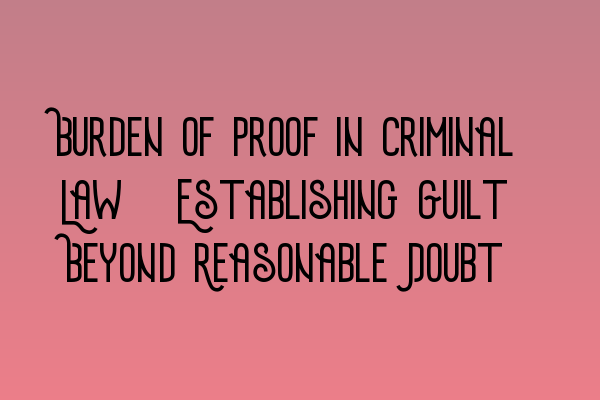Burden of Proof in Criminal Law: Establishing Guilt Beyond Reasonable Doubt
In criminal law, one of the fundamental concepts that ensures the fairness and integrity of the justice system is the burden of proof. When a person is accused of a crime, it is the responsibility of the prosecution to prove their guilt beyond a reasonable doubt. This high standard of proof is crucial to protect individuals from being wrongfully convicted.
What is the Burden of Proof?
The burden of proof refers to the obligation of the prosecution to present sufficient evidence to establish the guilt of the accused. It is the prosecution’s duty to convince the court or jury that the defendant committed the crime for which they are charged. This obligation is based on the principle that an individual is innocent until proven guilty.
Standard of Proof: Beyond Reasonable Doubt
The standard of proof required in criminal cases is “beyond reasonable doubt.” This means that the evidence presented by the prosecution must be so compelling that there is no reasonable doubt in the minds of the jurors or the court that the accused is guilty. It is not necessary to eliminate all possible doubts, but the doubt must be reasonable based on the evidence presented.
Establishing guilt beyond reasonable doubt is a high threshold, and for good reason. The consequences of a criminal conviction can be severe, including imprisonment, fines, and damage to one’s reputation. To ensure the fairness of the criminal justice system, it is essential to avoid convicting innocent individuals and safeguard their rights.
The Role of the Defense in Challenging the Burden of Proof
The defense plays a crucial role in challenging the burden of proof. Their aim is to introduce reasonable doubt in the minds of the jury or the court regarding the guilt of the accused. This can be achieved through various strategies, including cross-examination of prosecution witnesses, presenting alternative theories of the crime, or highlighting inconsistencies and contradictions in the evidence.
The defense may also present their own evidence or call witnesses to counter the prosecution’s case. By doing so, they aim to raise doubts about the credibility or validity of the prosecution’s evidence, weakening the prosecution’s ability to establish guilt beyond reasonable doubt.
Importance of Understanding the Burden of Proof for Legal Professionals
For legal professionals, such as solicitors and barristers, understanding the burden of proof is essential in effectively representing their clients. Knowledge of this concept allows them to identify weaknesses in the prosecution’s case and build a robust defense strategy. By challenging the evidence presented and introducing reasonable doubt, they can protect the rights and interests of their clients.
Keeping up with updates in UK criminal laws and participating in workshops and seminars is vital to staying informed and prepared. Workshops and Seminars on Criminal Practice: Expanding Your Expertise offers valuable resources to enhance your understanding of criminal law and practice.
Mock tests can also be highly beneficial in preparing for the SQE Criminal Practice exam. Mock Tests for SQE Criminal Practice: Exam Simulation for Success provide you with an opportunity to familiarize yourself with the exam format and assess your knowledge and skills.
Additionally, enhancing your study group experience can be advantageous in gaining different perspectives and insights. Enhancing Your SQE Criminal Law Study Group Experience can provide you with valuable tips and strategies for effective collaboration and learning.
Furthermore, in-depth knowledge of criminal evidence rules is crucial for any legal professional. Decoding Criminal Evidence Rules: A Detailed Analysis offers a comprehensive analysis of the rules and principles governing the admissibility and evaluation of evidence in criminal proceedings.
Conclusion
The burden of proof in criminal law requires the prosecution to establish the guilt of the accused beyond a reasonable doubt. This high standard of proof protects the rights of individuals and ensures the fairness of the justice system. Legal professionals must understand the burden of proof to effectively represent their clients and challenge the prosecution’s case. By staying informed, participating in workshops, and enhancing study group experiences, legal professionals can enhance their expertise in criminal practice.
